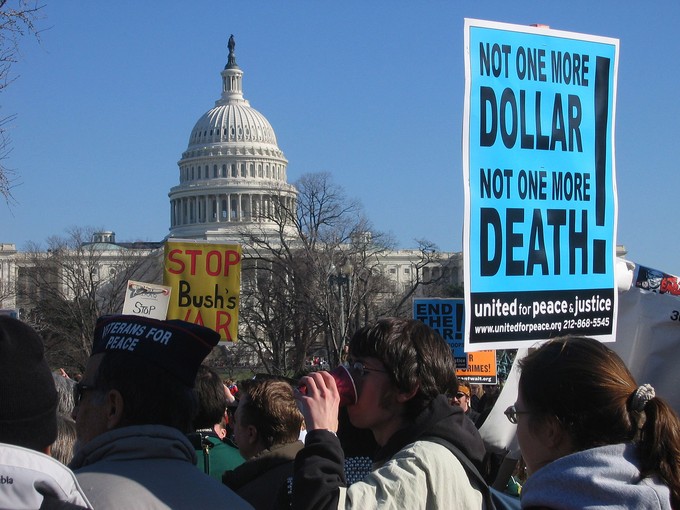18 Years of Invasion in Iraq
By
Lindsay Koshgarian
Posted:
|
Military & Security

People protesting the war in Washington, D.C. Photo courtesy of Aude at WIkimedia Commons.
It was 2003, and despite the largest worldwide protest ever, Congress blessed the wishes of President George W. Bush to invade Iraq. The U.S. entered into war in Iraq on March 20, 18 years ago this week. We have never left.
The costs have been almost unimaginable, according to the Brown University Costs of War Project. Together, the wars in Afghanistan and Iraq (along with spillovers into Syria, Yemen, and Pakistan) have directly led to the deaths of 800,000 people (nearly 300,000 more than have died in the U.S. during COVID). Many thousands more have been permanently wounded or died due to indirect causes like the destruction of hospitals and environmental contamination. The fighting and destruction has driven 37 million people from their homes. The Iraq invasion created fertile ground for the rise of ISIS, making the region and the world more dangerous. No one on any continent is safer thanks to this war.
The costs hit hard in the U.S., too. The U.S. has deployed 2.7 million of our own people to the war zones since 2001, and more than half of them have deployed more than once. More than 970,000 veterans have recognized disabilities due to the wars in Iraq and Afghanistan and neighboring countries. Every one of the deployed have family and friends who have been forced to cope with both their absence, and with the sometimes heartbreaking aftermath of their deployments.
The harm has extended even to people in the U.S. with no direct connection to the war or its veterans. For the $6.4 trillion that the U.S. has spent on endless war, we might have instead chosen to invest in a clean energy grid for the entire country, that could have eased the burden on Texans who lost power during this winter’s extreme cold – and could have given a huge head start on mitigating the causes of climate change. The $6.4 trillion could have more than covered the total costs of federal COVID relief to date. Or, it could have extended Medicaid to every uninsured and underinsured adult in the United States for the entire duration of the wars, improving American’s baseline health and potentially saving many lives when the pandemic hit.
Instead, we did none of that. Instead of a reliable, state-of-the-art clean energy grid, we have at least 58 people dead in Texas and troops still in Syria, where a drought exacerbated by climate change has contributed to the violence. Instead of paving the way financially for desperately needed COVID relief, we’ve spent $925 billion on interest alone from war debt. Instead of a healthier population and stronger healthcare system that could better withstand a dangerous virus, we have more than 539,000 dead.
We’ve had 18 years to learn that the costs of war are just too high. We must end the wars in Iraq and Afghanistan, and the next time our leaders inevitably argue for the necessity of war, it’s up to us to resist.